Anatomy of an Era: Gerald Armstrong, Part 2
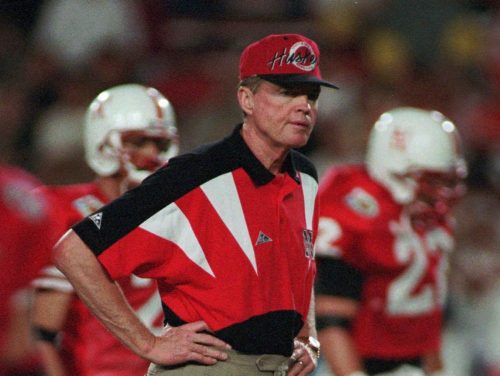
Excerpted from Chapter 96, No Place Like Nebraska: Anatomy of an Era, Vol. 2 by Paul Koch
Anatomy of an Era: Gerald Armstrong, Part 2
Q: Did you ever find yourself wishing you had one more year?
GA: I didn’t, oddly enough. I really left it on the field. I was pretty much done mentally. It took me probably two and a half, three years before I could actually sit down and watch a full game. It taxed me, apparently. It wasn’t like I didn’t like it anymore, but I needed a break. (laughs)
Q: Interesting. Nebraska games in particular?
GA: Not any game in particular. I was just busy with my own thing. I didn’t try to avoid it by any means. If a friend of mine had a ticket and asked me then I’d go, but it wasn’t until after that third year until I was actually able to start getting back into it and cheering again. And like I said, it wasn’t like I wasn’t cheering, but looking back on it I just guess I needed a break. (laughs)
Q: Was the CFL much of an eye-opener as far as differing from the Nebraska environment?
GA: I can’t speak for the NFL, but I’m just assuming it’s slightly less organized and professional, but it was still a business, about wins and losses and money. It wasn’t like that freshman year when you first started on the team, it was a lot more attitudes and egos out there. It just wasn’t much fun.
Q: What do you think set that pacesetting ’93 team apart from its contemporaries your senior year?
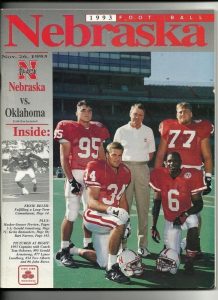
GA: I remember hearing at some point that one of the other players read in the paper that our recruiting class was supposed to be one of the worst recruiting classes they’d had at Nebraska in a long time. And I didn’t know any better. (laughs) Maybe it was true or not, but I do think we bonded well.
The guys who were from out of state? Back to the walk-on thing -they kind of ‘got it’ when guys were coming from Podunk, Nebraska and busting their tale and vying for a spot– and these guys were coming in with a scholarship and I’m sure a little bit of a chip on their shoulder, “You owe me a spot.” But for whatever reason it turned into everybody working and stepping in the same direction like an army. Like you put it, we all became warriors.
Q: It’s so easy to get caught up in personal issues and girls and ‘me, me, me.’ What do you think created that whole focus on the team concept rather than the individualistic focus? Did that primarily come from the top, from the players within, or a combination of the two?
GA: Some of that did come from the top. At some point in time they decided to start the Unity Council, and they actually brought us in and suggested, “What do you think about this?” The team thought it was a good idea and they didn’t force it on us and we started it.
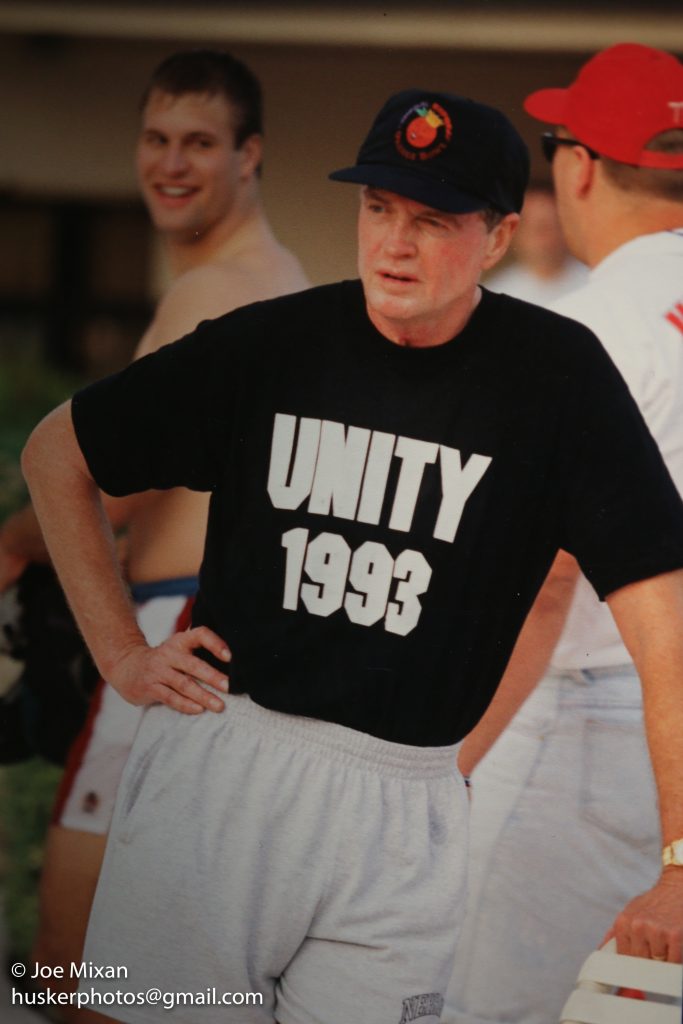
Tom Osborne and the Unity theme.
And one thing that accomplished (and I didn’t realize this until years later) is that there is so much power in getting some of these issues out in the open and kicking ’em around, throwing them out in the open and talking about it. And then? Then you just throw it in the trash and be done with it. There’s something so powerful about that.
And far as the team was concerned you didn’t get away with slouching or you didn’t get away with going half-speed, either. And that wasn’t just from the coaches, you know, the players expected just as much.
But that Unity Council helped the team progress. I’ve got to say that had a lot to do with why we started to gel, why we started to come together as teammates. It wasn’t like everybody hung out with everybody; there were cliques and there were people that liked each other just like any other part of society. I think that Unity Council had a lot more to do with the team coming together than some guys might like to admit, because talking about problems is not a big forte for 95% of the community. But doing that as a football team? I think it made leaps and bounds as far as progress.
Q: In sales that concept is called, “The elephant head in the living room.” A lot of people have a natural tendency to avoid confrontations, right? Do you recall any of those ‘elephant heads’ that, once were talked about, you could throw them aside and be done with them?
GA: I can’t speak to some of that stuff because we always said that was amongst the team only. That stuff didn’t leave the room, and that’s why it made it a little easier for guys to talk about it because it wasn’t going to end up somewhere else.
I do remember one -I’ll just generalize it- it got to the point where an individual got up and said, “How come this guy won’t say ‘Hi’ to me when I meet him in the hallway?” or something like that. Well, the guy got it off his chest and the other guys said, “Well, maybe he’s having a bad day and you need to leave him alone” or something silly like that. (laughs) So it was interesting to see what was going through people’s minds that would offend one person.
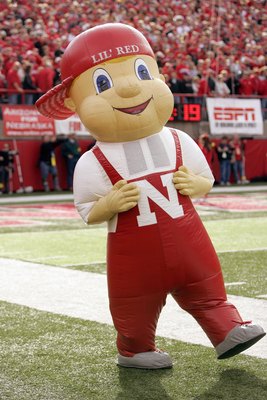
And like I said before, you get all these guys from different states and different walks of life and races and socio-economics and every different kind of variable you can think about, and just throw them together in a room and see what happens. Something’s going to happen, you know? (laughs) I think just having that Unity council there to hash things out -and even if the guys left the Unity Council mad? At least they got it off their chest and were able to move on from there.
Q: That’s what gets me, Gerald. In this sparsely populated state in the middle of the country you have these disparate individuals coming from all corners and classes and gelling into a very successful unit, a machine. It just boggles my mind, because of all sports I think football is the ultimate of all team sports, if for no other reason than it requires a full eleven men to work in unity, in perfect synchronicity, to be successful. We often throw the word ‘team’ around a little too loosely for my liking, because for the most part you have football ‘groups.’ The term ‘team’ should be reserved for those who truly put it all together and function as one cohesive unit… and you guys achieved that.
GA: Yeah, you’re absolutely right. And I think if you took some guys, even today, they’d laugh at that. For some guys, they didn’t need that: “I don’t need to talk about this.” For me, I don’t think I ever brought one thing up, but I certainly paid attention to what people were saying. It got quite interesting.
Q: If I recall, you were usually very quiet…
GA: Oh yeah, I was so introverted it was silly. Yeah, I was pretty anti-social for the most part. (laughs)
Q: But you led by example. Yes?
GA: I tried to. That’s right.
Q: I recall the effort you’d put forth in the weight room. You’d come in, put in the work and you were gone again. It wasn’t like you were coming in and shooting the bull for a full ten minutes between sets, making it a social occasion, you know?
GA: Well, that’s one of the beautiful things about not enjoying conversation: I had more time to do extra stuff. (laughs)
Q: (laughs) Do you have a favorite game or play sticks out to you?
GA: I guess, for me, I probably had a few really fun plays, especially my junior year when I was catching those touchdowns. That was a super high. That was pretty hard to get over that. And I’m trying not to brag here, but when I got recognized for the ESPN ‘Block of the Day’ when we were playing against Arizona State, to be recognized for what tight ends at Nebraska typically do, that was pretty cool.
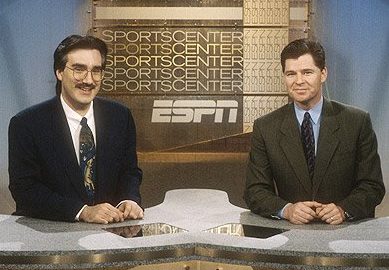
Q: What was the situation? Do you recall?
GA: I remember it was a Calvin Jones run to the right -and I had a kick-out block- and my end kind of went out anyway, so I gave him a quick shove since I knew he was going to be out of the play, then I ran upfield and sealed the linebacker, and then I took off upfield and Calvin made a cut-back and brought the safety to me and I knocked him on his butt and Calvin went in for the score. So I hit three guys on the play and Calvin went in for the touchdown.
Q: Gerald Armstrong: one-man wrecking crew, huh?
GA: Yeah, well hardly. I wasn’t all that big.
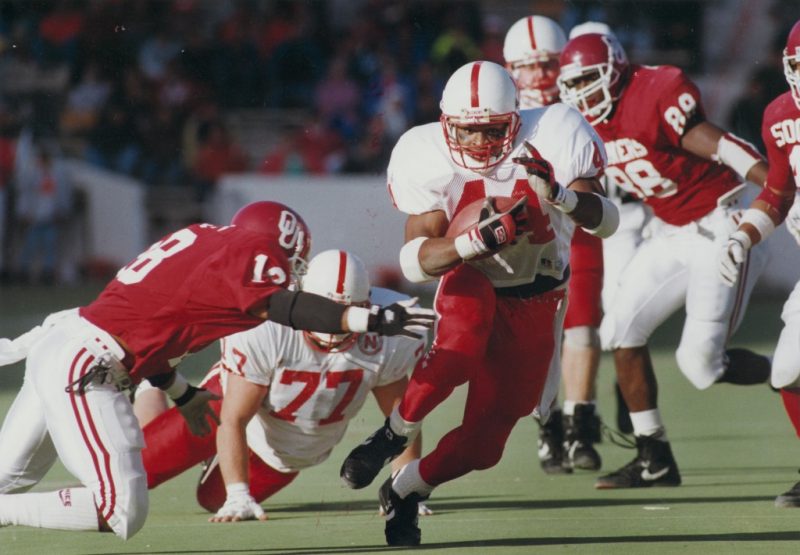
Q: You wanna hear something funny? I’m friends with a noted theologian whose brother used to coach O-line for the University of Illinois and was with the Browns and Buccaneers, and he then went to work picking video bits for all of ESPN’s football highlights. I have a feeling -with him being a former O-line coach- that he may have appreciated that bit of blocking and personally picked out that clip in recognition of your efforts.
GA: (laughs) That’s cool!
Q: So, were there any other coaches or staff members from that time who stand out to you as bringing something special to the table?
GA: You bet. As a tight end we got to spend some time down in the ‘meat locker’ with all the linemen and run certain combo plays with them. We usually did that once a week and got to spend some time with Milt Tenopir. And going down there was a different world. It’s so funny, because here’s this guy with a deep, scratchy voice where he hardly knows how to find a happy medium… he’s either idling or his footpedal is on the floorboard: he’s either talking or he’s screaming. It’s awesome the way he coached. He just wanted to get after it and get after the guys and motivate them.
But still, again, I don’t remember any of the coaches on offense degrading anyone. It might have been a little different on the defense. (laughs) I don’t want to bring up any names, but let’s just say I’m happy I played offense. (laughing)
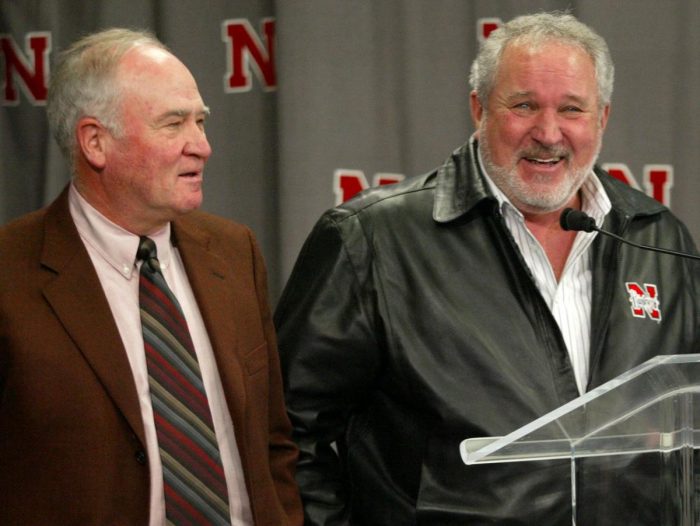
Q: I’ve heard some stories, Gerald. I know who you’re talking about. Any memorable practices?
GA: Well, there are a couple. One – this is awesome and I probably shouldn’t tell this, but I’ll tell it anyway. Mike Vedral reminded me about a practice we were having when they decided to go ones against ones and it was a skeleton passing deal, but they decided to go full speed. And they said, “Mike, we want you to go in there and pass block on this play, and we want you to block Travis Hill.” (laughs) We’d been working on it all week, you know? And we hardly ever worked on pass block, because when we were blocking we were always going forward, so this was completely alien to us. So he’s out there and Travis gets a jump on Mike and blows right by him and tags the quarterback. He doesn’t knock him down, but I heard, “Gerald, get in there!”
So I go in there and guess who’s in front of me? It’s Trev (Alberts). So I barely get one and a half hands on Trev and hardly get a shove on him, and he goes by me and gets the quarterback. And Coach Osborne stops practice and says, “Hit the showers!” Mike said that it was the only time he could ever remember Coach Osborne stopping a practice, and me and Mike Vedral were both responsible for it. (laughs) But that’s what they get for sending us in to do Will Washington’s job. He knew how to pass block.
Q: Will and Chris Garrett: those guys were pretty much tackles, weren’t they?
GA: Oh, my goodness. They made me look like a split end standing next to them.
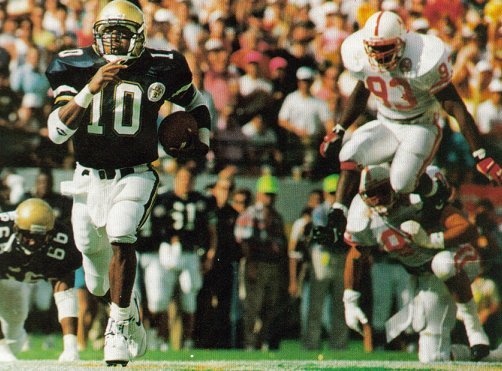
Q: A memorable off-field occasion that sums up your time there?
GA: You know, I do have a few stories, and some I can’t repeat. But do you remember after the football season was over and the seniors would go and play basketball all over the state? It was Husker Hoops and we played in different towns and all that; we’d put a team together and do some charities.
Well, I played and saw some crazy athleticism on the football field, but one of the craziest things I remember seeing was watching Lance Lundberg –and it would take a while to talk him into it because it required so much effort- but that guy could dunk a basketball when he weighed 305 or 310. It was one of the most amazing things I’d ever seen in my life. Some nights he would and some nights he wouldn’t, but I just remember trying to talk him into it because, ‘Hey, I want to see that again.’ The guy was 6’3, 6’4”, 310 and could put a basketball down? That just tells you that some of the Husker homegrowns actually had a little bit of talent. We actually talked a while ago doing an interview together for Murtaugh’s show.
Q: That’s neat. And I almost forgot to ask, did you eventually earn a scholarship?
GA: You know what? I’m glad you asked, because when I was a junior and Mike Vedral was a senior I was playing and Mike got a scholarship. And when he was done playing he had one semester left of school. And this is awesome -I don’t know why I hadn’t told this story earlier- but Mike was a friend of mine. He gave up his scholarship that last semester that he had full right to -on his own terms- so I could have it. That’s pretty cool. That’s one of the coolest things anybody’s ever done for me.
At the time when I was playing -like my junior year when I didn’t have a scholarship- I didn’t care, because that’s not why I was there. Obviously that would have been huge for myself and my family, but still, when Mike did that it was the most selfless thing anybody’s ever done for me.
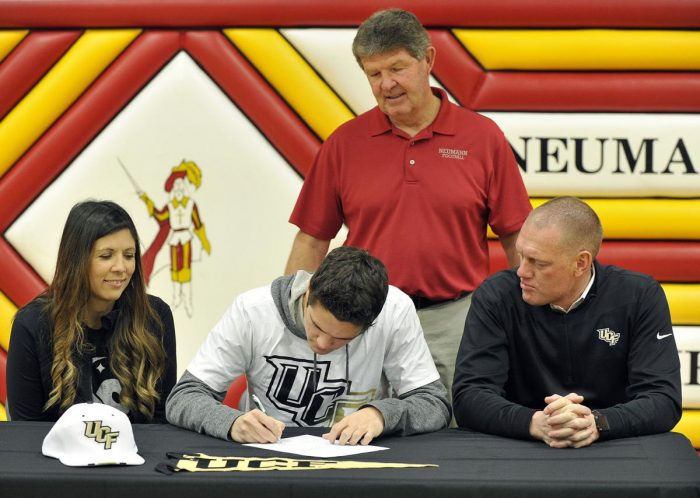
Mike Vedral (right)
Q: How incredibly gracious of him to do that? Now I have to ask if there was one person behind the scenes who you feel made a huge difference for the program? Is there a special person who you recall that made it all go?
GA: Besides Paul Koch?
Q: I’m not fishing for compliments, Gerald, but thanks anyway. (laughs)
GA: For me there were probably more than I realized, but the fact of the matter was, there was such professionalism on every level. I’m not trying to sound cheesy here, but with the weight training staff, with the academic counselors, and even the professors -regardless of whether they liked football players or didn’t like football players- they still made the effort to make things work out so we could be successful in the classroom. But the camaraderie and the friendship -and I wasn’t one of those “I have a hero”-kind of persons- but every level of the organization was just above professional.
Q: So you’re saying that it takes a team behind the team to make a team?
GA: Right, that is a good point, and a lot of people don’t understand what it takes to be a player.
And as far as unsung heroes go, for example, look at yourself: you guys busted your tails and were just as much part of the team as academics or the coaches were, you know? The only thing that you guys get is if we have a bad season they look at you guys and say, “We need to be faster and bigger.” (laughs) Don’t you think that? Or is that not true?
Q: Well, it’s a bit like you were saying: most of the folks on staff were born Nebraskans and could no longer play out there on the field, so they did what they could so you guys would. I think we all wanted to see you guys reach your maximum natural potential with the body the Lord gave you and build you up, you know?
GA: Right. (laughs)
Q: It seems like we were always trying to prove something to someone, and we wanted to see that work out in how you guys played.
GA: You know, I recently heard Coach Osborne on the radio and he was asked how he thought the Nebraska players were going to adapt or adjust to our going to the Big Ten. And his comment was more or less, “I think the players are more or less oblivious to it. They realize what’s happening and don’t care. What they want to do is play football and do what they know the best they can.“
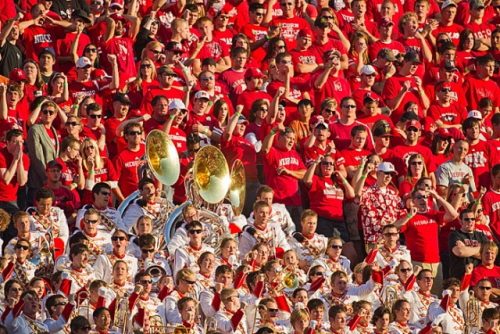
And that right there kind of explains a lot about the situation, because the people outside are kind of oblivious as to how it runs on the inside and the players are oblivious to why the fans are always talking about them, so it’s the perfect relationship. (laughs)
Q: A pleasant ignorance? (laughs)
GA: Exactly.
Q: Let’s face it, Gerald, a lot of folks showed up wearing red on gamedays and filled the stands and expected you guys to run out there an whoop up on whoever was on the other side, but the sacrifices, the effort, the battles, the wars you went through from Monday to Thursday, that stuff almost seems to almost outweigh most everything they witnessed on Saturday…
GA: Actually, that’s very true. I felt so much better after games than I did after Tuesday practices. It was brutal. That’s not even an exaggeration, that’s the way it was.
Q: Oh gosh, you guys had so many repetitions. You ran the equivalent of three to four times more plays per practice than you did in any game. Game day was a virtual day of rest?
GA: It was. (laughs) It was.
Q: So now that you’re getting to be a middle-aged man and have a greater perspective on life, what would you say you took away from that experience? What do you treasure most?
GA: There are some things I learned being at Nebraska, and one of the better things about it would be the camaraderie. You can go to college and you hang out with your buddies, but when you’re in the trenches with these guys and you know that you have to rely on him and he has to rely on you, that forms a bond. It’s not superficial; it’s real. It’s something that you can’t really make up in Hollywood, can’t manufacture. It happens for real. That’s what I miss the most about playing for Nebraska.
And interestingly enough, I think this is a bigger issue: A lot of these guys, when this game is over and they’re not moving on to the next level, (and most guys don’t) when that support is gone? It’s pretty empty. It’s pretty hard. That could be part of the reason why it took me two to three years to be away from it. I never had super ties with the coaches -and I loved them all. I could have reached out to them- but that wasn’t me. Quite a few guys, that’s quite a change in their life. But I wouldn’t want to not go through that, either. That might sound negative or not, you might not want to put that in your book…
Q: That’s a good point you bring up, though, Gerald. Here you spend the better part of 4 to 5 years rigorously and laboriously trying to reach a level of high-performing football player, then all of a sudden, ‘poof,’ it’s gone. Almost to a man, guys say that it was the camaraderie more that than rings and conference titles and victories, it was the journey and friendships you made that really mattered most.

Available on Amazon.com
GA: Right. I still talk to Mike Vedral and Matt Shaw and still see Mike Anderson and Troy Branch occasionally. Matt Penland, too. I see a lot of the guys around, but those guys in general.
Q: In summary, is there anything else worth sharing?
GA: No, I think you’ve been doing your homework. This was quite enjoyable. I appreciate your calling up and putting our voices out there. It’s kind of fun for us. I never would have thought that almost twenty years later that we’d be doing stuff like this. It’s kind of neat.
End conversation.
Gerald brought up one tidbit I found very enlightening, and it was his mention that “..confidence from a loss usually doesn’t come very often.” He’s right. Each one of them “left it out on the (Orange Bowl) field” in that early 1994 loss that, despite the officiating, they felt they’d won. They believed the victory was theirs’ on a physical level and a moral one, if not on the scoreboard. As a byproduct, it’s safe to say Tom Osborne and his staff did a superb job of creating a sense of ‘restless contentment’ -concurrent satisfaction with one’s performance level while also seeking to improve upon it. In essence, the remainder of that squad went forward with a pretty nasty attitude that next year. Hence, you had young men of all shapes and sizes relentlessly hitting the weights, studying film, eating smart, not drinking (nearly as much) alcohol and visiting the training room more often. The confidence in their roadmap and dedication to following it led to the future final results.
Then there was Gerald’s inspiring and unique perspective on the love of the game: “That spirit inside… some people, there’s certain things that they were meant to do and there’s just hardly anything that’s going to stop them from achieving it. For some reason I think I had that in me when it came to Nebraska football.” The game was part of an inherent trait in their DNA. It was as if this brutal sport was the one thing they were born to do, and to not fulfill that destiny was committal of a cosmic crime: letting God, state and family down via their own version of personal treason. It was as if Nebraska Football had chosen them, not that they had chosen Nebraska Football, because at its core, youngsters desire two things in life: 1) to find if they measure up and are good at something, and 2) to be praised for it. That last part is where the fan comes in.
Then there was his mention of the first Unity Council: “The team thought it was a good idea and they didn’t force it on us, and we started it.” I hadn’t thought of that. For him to mention that it wasn’t forced, but rather offered up, further helped cement a semblance of dedication and soul-seeking within the player ranks. Communication had always taken place in the organization, although it was now more effectual, more structured, more formal, and more purposeful. Don’t get me wrong, teams previous to 1993 had been effective communicators, too, but the Unity Council lessened many more miscommunications. And it could have become a powder keg with extremely negative consequences, as Gerald shared: “..you get all these guys from different states and different walks of life and races and socio-economics and every different kind of variable you can think about, and just throw them together in a room and see what happens. Something’s going to happen, you know?” That something was a thing of beauty. It was a bold move that turned out to be a great move. ”There’s something so powerful about that.”
Finally, he made the point that, “as far as the team was concerned, you didn’t get away with slouching or you didn’t get away with going half-speed. And that wasn’t just from the coaches, you know, the players expected just as much.” A truthful statement, to be sure. To drive the point home, here’s a little story I once heard second-hand from Husker fan Byron Peterson of Lincoln: “I was at a golf outing and we had Tom Osborne speak. He was asked what the secret to his success was. Osborne said, “It was everyone holding everyone accountable, giving 100% every play, every drill in practice, all the time.” Then he told us about Jason Peter. (I later asked Jason and he said “Yes, it was true”) The defensive guys just got done with their drill and all of a sudden Jason gets up and runs across the field… 40 yards down the field and just levels this guy, knocks him out of his shoes! The coaches run down there to find out what was going on. When they got there, Jason was foaming at the mouth. They asked him, “What are you doing?! What’s going on?!” He pointed and said, “He was loafin’, Coach.””
Notable quote #2:
Gerald Armstrong on the Unity Council’s effect: “..that Unity Council had a lot more to do with the team coming together than some guys might like to admit, because talking about problems is not a big forte for 95% of the community. But doing that as a football team, I think it made leaps and bounds as far as progress.”
Copyright @ 2013 Thermopylae Press. All Rights Reserved.
Photo Credits : Unknown Original Sources/Updates Welcomed
Author assumes no responsibility for interviewee errors or misstatements of fact.